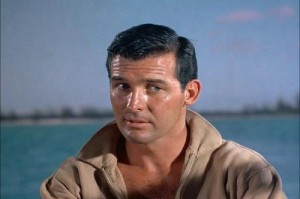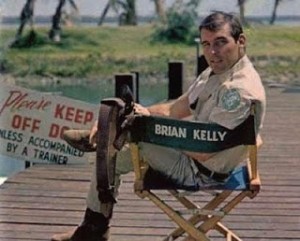 Fifty years ago, the Civil Rights Act was signed by President Lyndon Johnson, Beatlemania was in full bloom, a first-class stamp cost a nickel, and Ford rolled out the Mustang.
Fifty years ago, the Civil Rights Act was signed by President Lyndon Johnson, Beatlemania was in full bloom, a first-class stamp cost a nickel, and Ford rolled out the Mustang.
I was seven.
Fifty years ago the top stories in my life were becoming a first grader at St. Francis of Assisi School and the debut of the NBC television show Flipper. First grade starred Mrs. McGibney, patient and kindly and smelling of lilacs and baby powder. Flipper starred a dolphin and the character Porter Ricks, a dad and a ranger who was capable and dreamy and very deeply suntanned.
Porter Ricks was played by the actor Brian Kelly. He was my uncle.
Flipper was about a bottlenose dolphin who befriends two momless boys and their dad—Uncle Brian. On the show Uncle Brian’s character is a widower and the warden at the fictional Coral Key State Park. He drives a boat and wears a gold star on his khaki uniform like a beachy sheriff in a world where the bad guys wear masks and snorkels.
When there is trouble afoot, Flipper feels the vibe and becomes aquatic Lassie. He swims to the dock behind the Ricks’ house, rises onto his tailfin, and bleats insistent dolphin sounds that telegraph danger and urgency. Uncle Brian and the shirtless and barefoot boys jump into their boat and follow Flipper to the trouble. Every week Flipper saves the day. Every show ends with corny dolphin hijinks and shared laughter as Flipper splashes his way into everyone’s heart.
I was enthralled, and so was the nation. The program was a huge hit.
The only time I saw Uncle Brian in person I was 8 or 9. Aunts and uncles and cousins were at our house. We kids are on the swingset; the grownups hold highballs and cluster around the patio table.
Uncle Brian is there looking just like he looks on TV. I don’t know how long he stays or if he says anything to me. At some point he gives all of us kids big, shiny black & white photographs of Flipper in the water standing on his tailfin. He looks as if he is smiling, but that’s the thing with dolphins. They always have that look. On the bottom of the photograph it says: Best Wishes, Flipper.
I am pretty sure I was old enough to know that dolphins can’t write, but so what? The photo was from Uncle Brian, and he was on TV. I got extra coolness points from the kids at school just for being related to him.
 My little girl brain and heart couldn’t recognize this then, but as I watched “Flipper” for the four years it played on TV, I was morphing from childhood into early adolescence, gathering data to define men and women, good and bad, truth and beauty. During those years Uncle Brian became a unit of measure. Every week on “Flipper” he defined male heroism at its most dashing, valiant and telegenic. He staked out territory in the realm of capital letters. Uncle Brian was The Handsomest Man In The Whole Wide World.
My little girl brain and heart couldn’t recognize this then, but as I watched “Flipper” for the four years it played on TV, I was morphing from childhood into early adolescence, gathering data to define men and women, good and bad, truth and beauty. During those years Uncle Brian became a unit of measure. Every week on “Flipper” he defined male heroism at its most dashing, valiant and telegenic. He staked out territory in the realm of capital letters. Uncle Brian was The Handsomest Man In The Whole Wide World.
I didn’t really know anything about him beyond his handsomeness. I knew about Porter Ricks, but never grew to distinguish Uncle Brian from the character he played on TV. Was he kind? Was he happy? Did he know how to swim?
Uncle Brian wasn’t really my uncle. He was the son of my grandfather’s older brother, which technically makes him my second cousin. My brothers and sisters and I called him uncle because when we were kids, he was a grownup.
He was a fraternal twin born on Valentine’s Day who pretty much cornered all the handsomeness doled out to the duo. There are some people who win some kind of genetic lottery without every really playing. All their features line up to create a standard of beauty that crosses cultures and maybe even the borders of galaxies. Uncle Brian was one of those people.
In the show’s opening credits, Uncle Brian stands on a sandy beach. Palm trees sway behind him, and the sea breeze ruffles his dark hair. The theme song swells and lets us know that Flipper is fast (“faster than lightning”) and really, really smart (“No one you see is smarter than he.”).
Uncle Brian’s two TV sons were Bud and Sandy. Bud was a ginger-haired kid, who was at the age where he still thought it was hilarious to make fart sounds. Sandy was a teenager with blonde hair and frequent appearances on the cover of Teen Beat magazine. Girls my age thought Sandy was cute. He was okay, but next to Uncle Brian, Sandy was a cream puff in cut-offs.
Wikipedia calls Uncle Brian’s character “the show’s moral center,” which means he made the hokey pronouncements that constituted the show’s teaching moments. The site describes Porter Ricks as “a loving father, conscientious government employee, rugged outdoorsman and all-around good guy.”
Further research about Uncle Brian yields this morsel. On Porter Ricks’ single status on the show, he told TV Guide in a 1966 interview: “I’m going to bring a couple of bikini girls on. I want some groovy-lookin’ girls because a lot of fathers who see the show say, ‘Where are the chicks?’”
I was 11 when Flipper had its last season. According to a website devoted to Uncle Brian, after playing such a do-gooder dad, he wanted to spice up his image, so he was cast as the lead in The Love Machine, a cheesy early 1970s film about a promiscuous TV news reporter. Shortly after filming began, he was in a motorcycle accident that left him partially paralyzed. He never appeared on screen again but worked on the other side of the business and went on to produce Blade Runner and other films. He died seven years ago.
In one of the professionally produced photos from my parents’ wedding day in 1956, my mom and dad are about to cut the cake. Both hold a single, ornate knife and smile at the camera. Mom and Dad are young and radiant. Behind them is Uncle Brian in a white tuxedo radiating Warp Factor 10 Super Handsomeness. My mother gave me that photo years back. From time to time I take it out and look at it. Something inside me stirs.
Originally a flatlander, Laura Kelly found Flagstaff eight years ago and knew it was home. She was the executive director of the Flagstaff Symphony Orchestra for four years and last year created the ArtBox Institute for the Flagstaff Arts Council. She was awarded a Fulbright Scholar grant to teach journalism and storytelling in Bishkek, Kyrgyzstan. She’ll be back in Flag next year telling stories about where she’s been.

